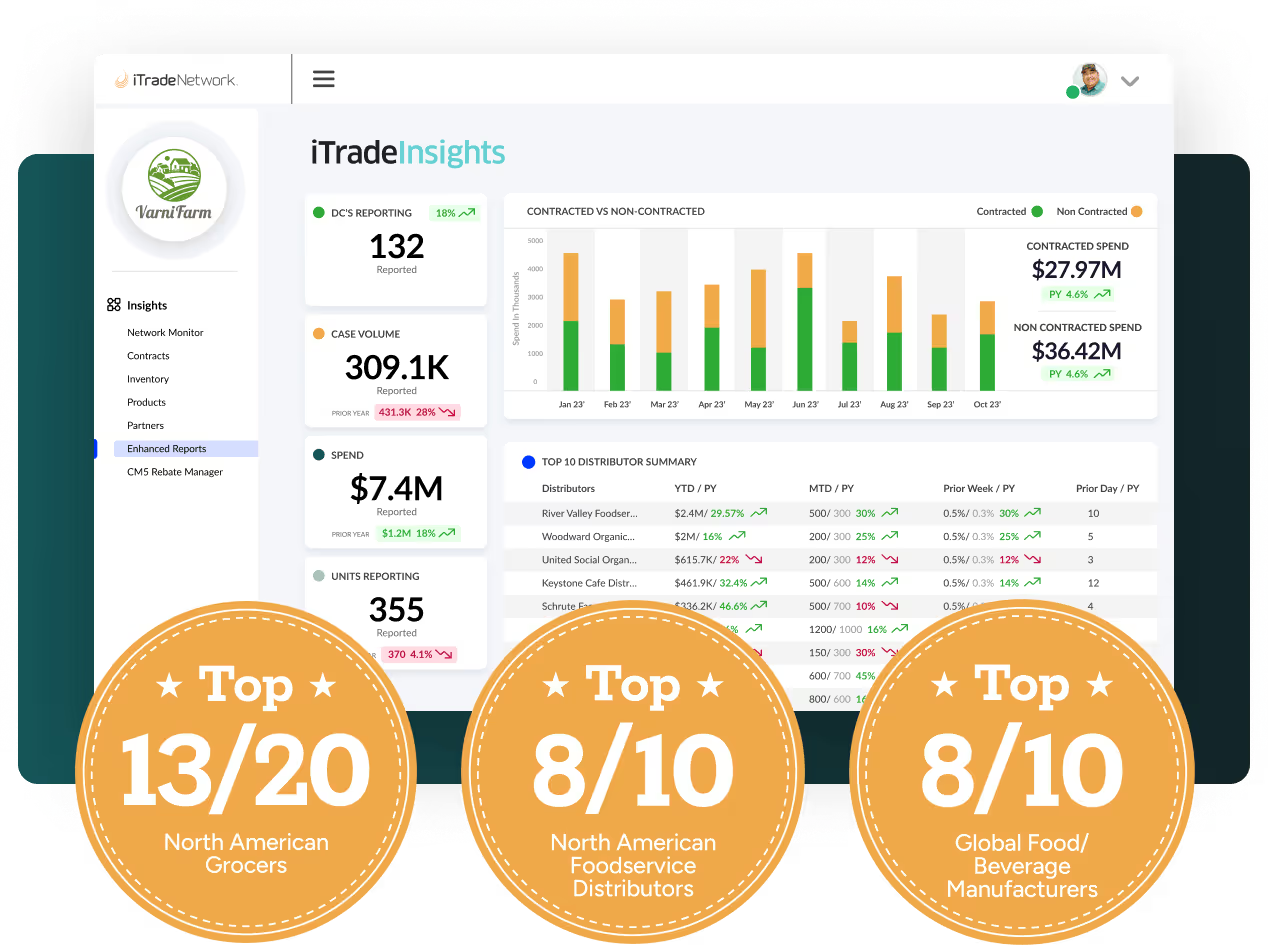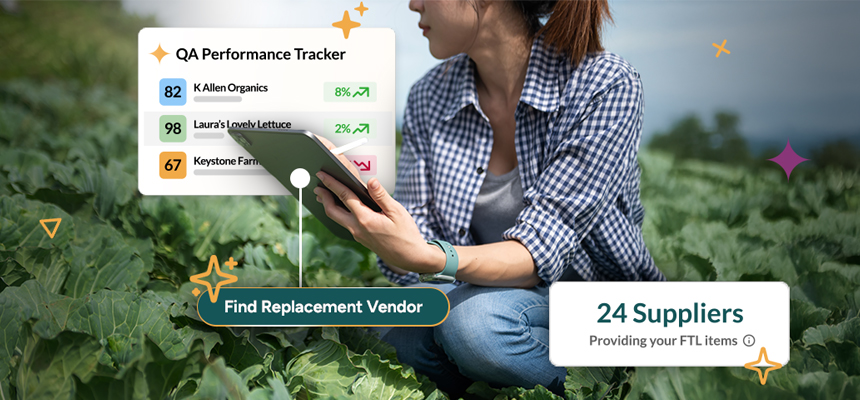FSMA 204 Compliance Made Simple

Essential Tips for Suppliers Trading Items on the FDA's Food Traceability List
For suppliers dealing with perishable goods on the FDA's Food Traceability List (FTL), the countdown to compliance with the FSMA 204 rule is underway. This regulation mandates a robust record-keeping system for tracking certain foods, aimed at streamlining traceability in the event of a foodborne illness outbreak. As the FDA states, "The final rule facilitates faster identification and removal of potentially contaminated food from the market, ultimately improving food safety for consumers."
To help suppliers understand their role and prepare, here’s a breakdown of what FSMA 204 compliance entails and how iTradeNetwork can support suppliers in meeting these requirements efficiently.
Understanding the Key Components of FSMA 204 Compliance
FSMA 204 (part of the FDA’s Food Safety Modernization Act) requires suppliers to capture and share specific traceability data, known as Key Data Elements (KDEs), at Critical Tracking Events (CTEs) throughout the supply chain. For those handling foods on the FTL, this includes capturing lot codes, physical location data, and other identifiers to ensure traceability from the point of origin through to the end consumer.
Notably, the FTL includes high-risk foods like leafy greens, melons, tomatoes, and various seafood products. Review the full list from the FDA: FSMA Final Rule on Requirements for Additional Traceability Records for Certain Foods Companies involved in manufacturing, processing, packing, or holding these items are required to maintain enhanced record-keeping practices for these specific foods.
%2520(1).jpeg)
Capturing Key Data Elements (KDEs) at Critical Tracking Events (CTEs): Compliance with FSMA 204 means recording KDEs—such as the traceability lot code, location information, and product specifics—at each CTE. For instance, capturing the harvesting, cooling, and packing information for produce is vital, as this is often where data gaps appear.
Sharing Data Across the Supply Chain: Suppliers must provide this traceability information to their trading partners, including buyers who are already implementing data-sharing best practices. Leading retailers are already starting to require FSMA-compliant traceability data with every shipment, emphasizing the urgency of implementing a seamless data-sharing process.
Meeting the January 20, 2026 Deadline: The FDA’s compliance deadline is set for January 2026, giving suppliers a finite timeframe to implement these changes. However, early adoption is encouraged to align with trading partners who may already be enforcing these standards.
Common Challenges and How iTradeNetwork Can Help
The process of integrating FSMA 204 requirements poses several challenges for suppliers, especially in capturing all necessary data from the “first mile” (harvesting, cooling, packing). A recent audit revealed that many suppliers are missing crucial data elements, such as traceability lot codes, which can result in non-compliance with the rule. This is where iTradeNetwork’s expertise comes into play, with solutions specifically designed to address the FSMA 204 requirements.
- Real-Time Data Capture and Sharing: iTradeNetwork captures KDEs at critical points in the supply chain, ensuring that suppliers meet both regulatory and retailer requirements. Unlike other solutions that may only share data, iTrade’s platform captures and integrates KDEs natively across all CTEs, supporting a seamless data flow.
- Customized Compliance Solutions: iTradeNetwork offers tools that allow suppliers to manage traceability data in ways that fit their unique operational needs. For example, iTradeNetwork’s OMS provides an option for sending FSMA 204 Advanced Shipping Notices (ASNs) directly through the platform, either via portal or integrated Electronic Data Interchange (EDI) for automated processing.
- FSMA 204 Labeling Solution: Many suppliers mistakenly assume that their existing Produce Traceability Initiative (PTI) labels are FSMA 204-compliant. However, iTradeNetwork has found that additional KDEs are often missing. With the iTracefresh Label solution, suppliers can ensure they are capturing and displaying all necessary information on their labels to meet FSMA 204 standards fully.
-3.jpeg)
Next Steps for Suppliers
With the countdown to January 2026 underway, now is the time for suppliers to evaluate their current systems and ensure they meet the FDA’s traceability requirements. Here are some key questions to consider:
- Are your current labels capturing all required data elements, including traceability lot codes?
- Have you confirmed with your trading partners that your data-sharing methods align with their requirements?
- Is your team prepared to handle the increased data-sharing demands that FSMA 204 compliance will bring?
For those suppliers ready to take the next step, iTradeNetwork offers a comprehensive assessment of your current labeling solution, as well as a curated plan for your business to achieve FSMA 204 compliance. By ensuring accurate, real-time data capture and sharing capabilities, iTradeNetwork supports suppliers in meeting regulatory demands, building trust with buyers, and enhancing food safety for consumers.
Want to learn more about FSMA 204 Compliance? Click here!
Speak to an Expert
Take a closer look at the platform built for buyers and their trading partners

FSMA 204 Compliance Made Simple
Essential Tips for Suppliers Trading Items on the FDA's Food Traceability List
For suppliers dealing with perishable goods on the FDA's Food Traceability List (FTL), the countdown to compliance with the FSMA 204 rule is underway. This regulation mandates a robust record-keeping system for tracking certain foods, aimed at streamlining traceability in the event of a foodborne illness outbreak. As the FDA states, "The final rule facilitates faster identification and removal of potentially contaminated food from the market, ultimately improving food safety for consumers."
To help suppliers understand their role and prepare, here’s a breakdown of what FSMA 204 compliance entails and how iTradeNetwork can support suppliers in meeting these requirements efficiently.
Understanding the Key Components of FSMA 204 Compliance
FSMA 204 (part of the FDA’s Food Safety Modernization Act) requires suppliers to capture and share specific traceability data, known as Key Data Elements (KDEs), at Critical Tracking Events (CTEs) throughout the supply chain. For those handling foods on the FTL, this includes capturing lot codes, physical location data, and other identifiers to ensure traceability from the point of origin through to the end consumer.
Notably, the FTL includes high-risk foods like leafy greens, melons, tomatoes, and various seafood products. Review the full list from the FDA: FSMA Final Rule on Requirements for Additional Traceability Records for Certain Foods Companies involved in manufacturing, processing, packing, or holding these items are required to maintain enhanced record-keeping practices for these specific foods.
%2520(1).jpeg)
Capturing Key Data Elements (KDEs) at Critical Tracking Events (CTEs): Compliance with FSMA 204 means recording KDEs—such as the traceability lot code, location information, and product specifics—at each CTE. For instance, capturing the harvesting, cooling, and packing information for produce is vital, as this is often where data gaps appear.
Sharing Data Across the Supply Chain: Suppliers must provide this traceability information to their trading partners, including buyers who are already implementing data-sharing best practices. Leading retailers are already starting to require FSMA-compliant traceability data with every shipment, emphasizing the urgency of implementing a seamless data-sharing process.
Meeting the January 20, 2026 Deadline: The FDA’s compliance deadline is set for January 2026, giving suppliers a finite timeframe to implement these changes. However, early adoption is encouraged to align with trading partners who may already be enforcing these standards.
Common Challenges and How iTradeNetwork Can Help
The process of integrating FSMA 204 requirements poses several challenges for suppliers, especially in capturing all necessary data from the “first mile” (harvesting, cooling, packing). A recent audit revealed that many suppliers are missing crucial data elements, such as traceability lot codes, which can result in non-compliance with the rule. This is where iTradeNetwork’s expertise comes into play, with solutions specifically designed to address the FSMA 204 requirements.
- Real-Time Data Capture and Sharing: iTradeNetwork captures KDEs at critical points in the supply chain, ensuring that suppliers meet both regulatory and retailer requirements. Unlike other solutions that may only share data, iTrade’s platform captures and integrates KDEs natively across all CTEs, supporting a seamless data flow.
- Customized Compliance Solutions: iTradeNetwork offers tools that allow suppliers to manage traceability data in ways that fit their unique operational needs. For example, iTradeNetwork’s OMS provides an option for sending FSMA 204 Advanced Shipping Notices (ASNs) directly through the platform, either via portal or integrated Electronic Data Interchange (EDI) for automated processing.
- FSMA 204 Labeling Solution: Many suppliers mistakenly assume that their existing Produce Traceability Initiative (PTI) labels are FSMA 204-compliant. However, iTradeNetwork has found that additional KDEs are often missing. With the iTracefresh Label solution, suppliers can ensure they are capturing and displaying all necessary information on their labels to meet FSMA 204 standards fully.
-3.jpeg)
Next Steps for Suppliers
With the countdown to January 2026 underway, now is the time for suppliers to evaluate their current systems and ensure they meet the FDA’s traceability requirements. Here are some key questions to consider:
- Are your current labels capturing all required data elements, including traceability lot codes?
- Have you confirmed with your trading partners that your data-sharing methods align with their requirements?
- Is your team prepared to handle the increased data-sharing demands that FSMA 204 compliance will bring?
For those suppliers ready to take the next step, iTradeNetwork offers a comprehensive assessment of your current labeling solution, as well as a curated plan for your business to achieve FSMA 204 compliance. By ensuring accurate, real-time data capture and sharing capabilities, iTradeNetwork supports suppliers in meeting regulatory demands, building trust with buyers, and enhancing food safety for consumers.
Want to learn more about FSMA 204 Compliance? Click here!
Unlock It Now!





